how to clean cats teeth
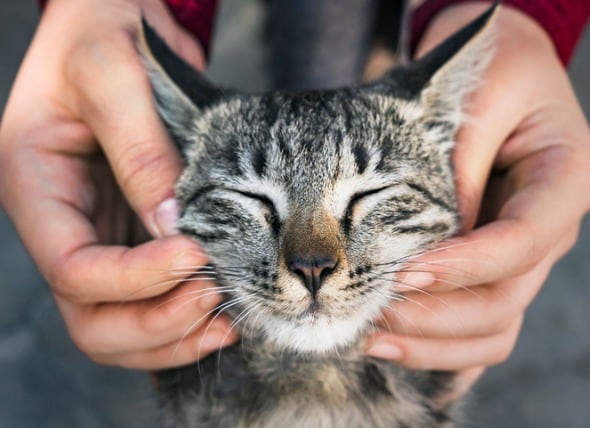
Be Proactive About Your Cat's Dental Health
Reviewed and updated for accuracy on December 4, 2019 by Dr. Hanie Elfenbein, DVM, PhD
Cats can't tell us when they have a toothache or if they are feeling discomfort when they eat. But they can still suffer from painful dental issues that can have serious impacts on their overall health.
You wouldn't know it, though, because cats are masters at hiding their pain and making it seem like everything's fine.
Being proactive about your cat's dental health can help to prevent them from developing a painful mouth and needing to undergo uncomfortable—and expensive—surgery.
Here are 9 ways you can be proactive about improving your cat's dental care.
Image: Rawpixel / iStock.com
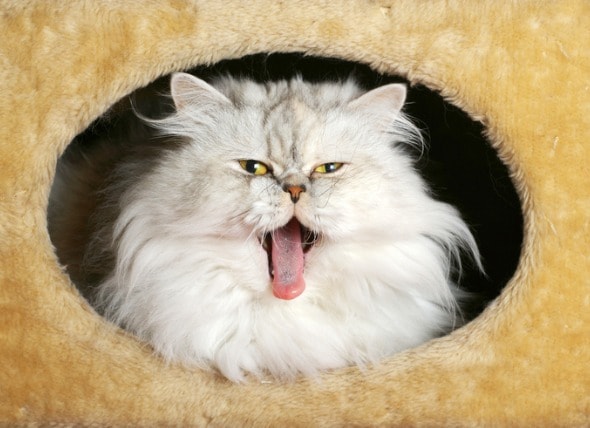
Don't Ignore Bad Breath
That mild fishy scent known as "kitty breath" may seem normal to pet parents, but if your cat has bad breath, this is a strong indicator that they have dental problems.
If left untreated, your cat's breath is only going to get worse. When an animal has bad breath and is drooling, the cause is often related to gum disease and/or tooth decay.
Occasional bleeding gums are nothing to become too alarmed about, but if your cat has a combination of bleeding gums and bad breath, and these symptoms are accompanied by drooling, then your cat likely needs a deep cleaning or even a tooth extraction.
Image: JoannElle / iStock.com
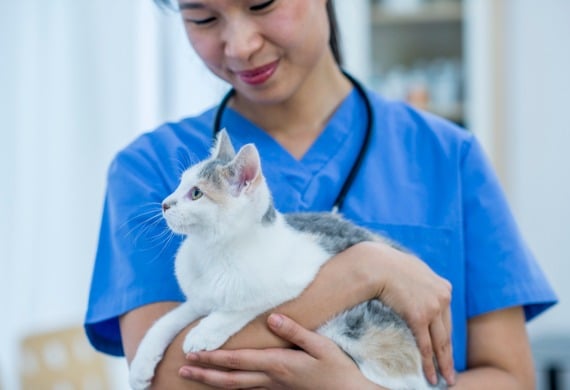
Take Your Cat for Annual Checkups
Unfortunately, a dental checkup is something most people don't think about as part of the yearly trip to the veterinarian. But cats can suffer from dental issues that, if unchecked, can lead to serious health problems.
So don't skimp on your cat's annual checkups. Dental health is an important part of your cat's annual visit, and your veterinarian will use that time to evaluate your cat's overall health as well as their oral health.
At this visit, they will let you know when your cat is due for a professional veterinary dental cleaning to help improve your cat's dental health.
Image: Fat Camera / iStock.com
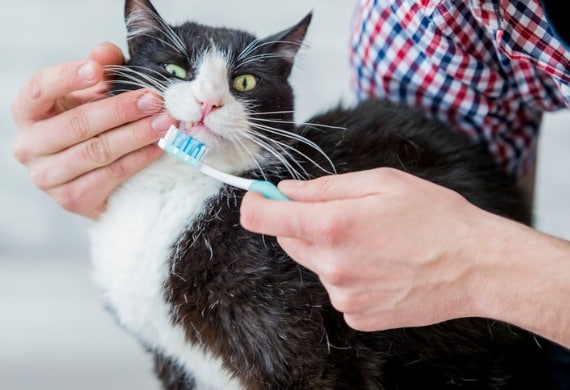
Start Your Cat's Daily Dental Care Routine (and Stick to It)
It's not too tricky to get cats used to getting their teeth cleaned. Adult cats are often more resistant, though, so it's a good idea to get them started young.
The American Veterinary Medical Association (AVMA) recommends getting cats used to the process while they're kittens by using gauze along with toothpaste made specifically for cats.
You can also try dipping your finger into canned tuna or chicken before rubbing it on your kitty's gums to make the experience more pleasant.
Once your cat understands the process, slowly transition to a bristled finger brush or other cat-specific toothbrush.
Daily brushing is the absolute BEST way to prevent dental disease.
Toothpaste specially designed for cats is readily available in flavors they'll enjoy. Do NOT try to brush your cat's teeth with "people" toothpaste; if fluoride toothpaste is ingested, it can make your cat severely ill.
Image: FatCamera / iStock.com
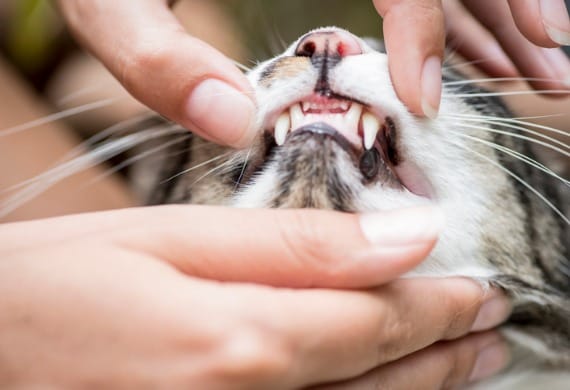
Stimulate Their Gums While Brushing
Tooth decay usually starts with irritated or inflamed gums, so however you're able to maintain your cat's oral health, don't forget to massage their gums when you can.
Gums should normally be pink and healthy, not red in appearance or irritated. If your cat's gums are inflamed and red, then it can be a sign of dental disease.
By massaging your cat's gums, you can not only accelerate healing, but also strengthen the gums so your cat will be less likely to suffer from gum problems later on.
Image: pabst_ell / iStock.com
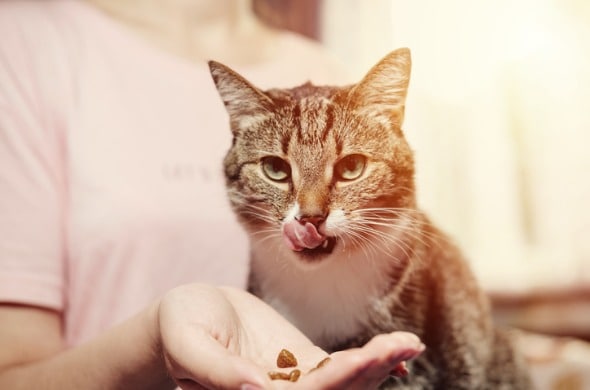
Ask Your Veterinarian About Dental Diets for Cats
Diet is another important factor in maintaining your cat's teeth.
Talk with your veterinarian to figure out the best food for your cat's overall health and also their dental health.
For cats with dental disease or oral health issues, there are prescription diets that are specifically designed to help improve a cat's dental health.
These diets have been clinically proven to maintain good dental health when fed to cats.
Image: Denis Valakhanovich / iStock.com
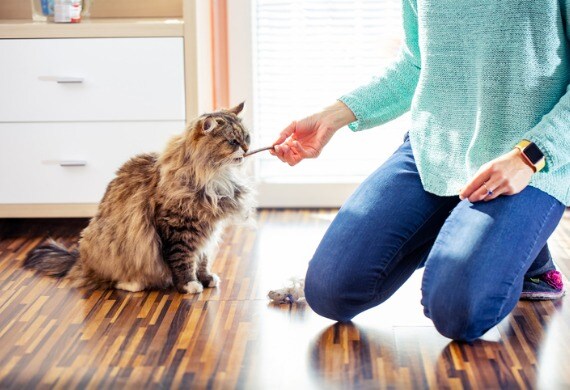
Certain Treats Can Actually Help Reduce Tartar
Not all dental chews and treats for cats are equal. Make sure that any products you choose to use are approved by the Veterinary Oral Health Council (VOHC). Approved products have met a standard of effectiveness and gone through clinical trials.
Some examples of VOHC-approved products for cats include Greenies, Dentalife by Purina, and Dentabites from Whiskas.
Tartar-control treats and chews alone are not sufficient for effectively cleaning your cat's teeth, but they can be used in moderation alongside a daily toothbrushing routine and a healthy diet.
You can even try using healthy chews and treats as a reward for good behavior while getting your cat used to having their teeth cleaned.
Image: CasarsaGuru / iStock.com
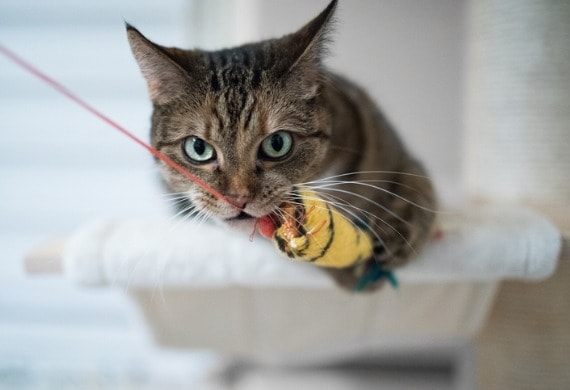
Toys Can Help Your Cat's Dental Health, Too
Cats are predators, so part of their natural diet consists of hard bones. Chewing bones knocks off tartar and helps keep their teeth and gums healthy.
Since domesticated cats aren't eating mice and other animals for their daily meals, some veterinarians recommend giving them hard toys to chew on.
Any chew toy you get for your cat should not be any harder than your fingernail. Toys that are too hard can cause tooth fractures. Look for toys that are made specifically for cats.
Image: Nils Jacobi / iStock.com
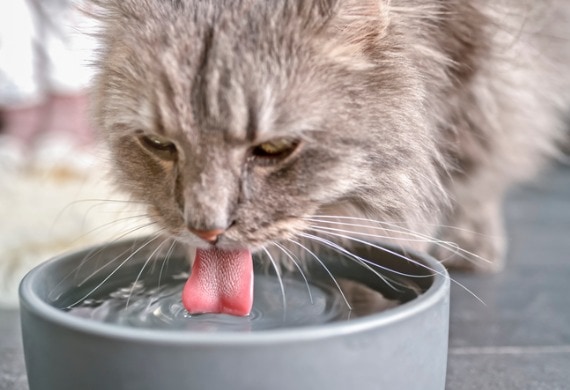
Even Fresh Water Helps Your Cat's Teeth
Drinking helps wash away any food debris left in a cat's mouth after a meal, so make sure your cat always has lots of fresh water to drink.
Food debris feeds the bacteria that cause gingivitis and make your cat's mouth uncomfortable.
Image: simonkr / iStock.com
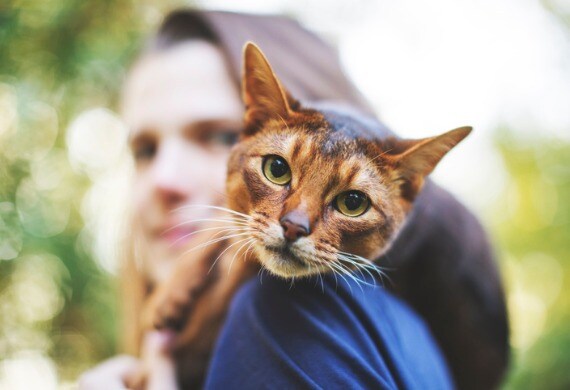
Never Ignore Your Cat's Dental Health
Tooth decay and gum disease have been linked to heart disease, kidney disease and other serious chronic illnesses.
Don't wait until your cat shows signs of distress to have their teeth checked out.
Many cats do not show obvious signs of discomfort until they're in considerable pain. A daily dental care routine, yearly checkups and a good diet can ensure that your cat stays happy and healthy.
Image: yulkapopkova / iStock.com
Additional Slideshows
how to clean cats teeth
Source: https://www.petmd.com/cat/slideshows/grooming/top-ten-tips-on-how-to-keep-your-cats-teeth-clean
Posted by: moakwithet.blogspot.com

0 Response to "how to clean cats teeth"
Post a Comment